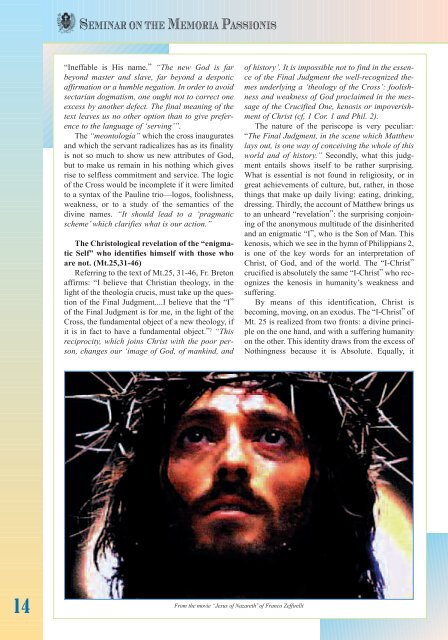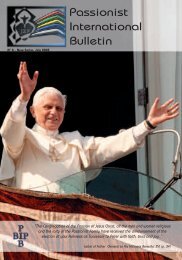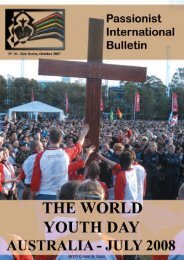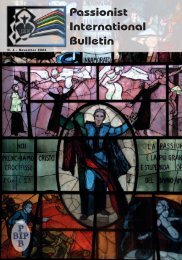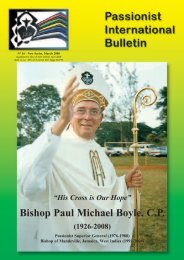seminar on the memoria passionis“Ineffable is His name.” “The new God is farbeyond master and slave, far beyond a despoticaffirmation or a humble negation. In order to avoidsectarian dogmatism, one ought not to correct oneexcess by another defect. The final meaning of thetext leaves us no other option than to give preferenceto the language of ‘serving’”.The “meontología” which the cross inauguratesand which the servant radicalizes has as its finalityis not so much to show us new attributes of God,but to make us remain in his nothing which givesrise to selfless commitment and service. The logicof the Cross would be incomplete if it were limitedto a syntax of the Pauline trio—logos, foolishness,weakness, or to a study of the semantics of thedivine names. “It should lead to a ‘pragmaticscheme’ which clarifies what is our action.”The Christological revelation of the “enigmaticSelf” who identifies himself with those whoare not. (Mt.25,31-46)Referring to the text of Mt.25, 31-46, Fr. Bretonaffirms: “I believe that Christian theology, in thelight of the theologia crucis, must take up the questionof the Final Judgment....I believe that the “I”of the Final Judgment is for me, in the light of theCross, the fundamental object of a new theology, ifit is in fact to have a fundamental object.” 2 “Thisreciprocity, which joins Christ with the poor person,changes our ‘image of God, of mankind, andof history’. It is impossible not to find in the essenceof the Final Judgment the well-recognized themesunderlying a ‘theology of the Cross’: foolishnessand weakness of God proclaimed in the messageof the Crucified One, kenosis or impoverishmentof Christ (cf, 1 Cor. 1 and Phil. 2).The nature of the periscope is very peculiar:“The Final Judgment, in the scene which Matthewlays out, is one way of conceiving the whole of thisworld and of history.” Secondly, what this judgmententails shows itself to be rather surprising.What is essential is not found in religiosity, or ingreat achievements of culture, but, rather, in thosethings that make up daily living: eating, drinking,dressing. Thirdly, the account of Matthew brings usto an unheard “revelation”: the surprising conjoiningof the anonymous multitude of the disinheritedand an enigmatic “I”, who is the Son of Man. Thiskenosis, which we see in the hymn of Philippians 2,is one of the key words for an interpretation ofChrist, of God, and of the world. The “I-Christ”crucified is absolutely the same “I-Christ” who recognizesthe kenosis in humanity’s weakness andsuffering.By means of this identification, Christ isbecoming, moving, on an exodus. The “I-Christ” ofMt. 25 is realized from two fronts: a divine principleon the one hand, and with a suffering humanityon the other. This identity draws from the excess ofNothingness because it is Absolute. Equally, it14From the movie “Jesus of Nazareth”of Franco Zeffirelli
seminar on the memoria passionisdraws from the desperation and from the nothingnessof all who are marginalized. The act of faith inthe service toward the poor does not stop being“transcendence in immanence”. This is why “liberationfrom suffering enters into our world, throughthe active presence of Christ in the historical comingof the very self-same being of God.”As a conclusion to this initial survey, one canstate: The “logos staurós” built on the Paulinekerygma and a Matthean reference is the content ofthe “Memoria Passionis”: A memory of the Crossand of the One Crucified as a locus for the givingof God in foolishness and weakness; a memory ofthe loving kenosis which gives rise to agape andservice as ways of being; recognition and commitmentwhich are called forth by the paradoxicalpresence of the “I-Christ” in history’s disinheritedmasses.II. “Concepts” used by Fr. Breton which helpus to grasp the nature of the category MemoriaPassionis, understood as “context” [‘ámbito’].The Christian creed and its living, as presentedby Fr. Breton, is profoundly dynamic. It is a “newway of being”; a new canon; a new configuration of“mentis et cordis”. The concepts, or dynamisms,which I list, might be called structures of humanreality, the dynamic elements of the human spirit,which are impregnated by the being and activity ofGod “on the Cross and in the One Crucified”. Someof these which help understand the categoryMemoria Passionis as ‘ámbito’ are: the concept of‘place’, ‘remaining’, perceiving mode, me-ontologicaldistance. To these are added the activities ofthe human spirit, in analogy with the ‘actions of theWord’ which we find in the Johannine works.Perspectives, in the manner of a conclusionIn a large part of contemporary theology,“Memoria Passionis” is the memory of the sorrowexperienced in the face of God, a praxis for thebuilding up of a world from the perspective of thevictims, so that the future reflects the memory of itspast sorrows and its unrealized hopes, as well as thenecessity of a “new way of talking about God”which is not alien to human suffering, but is ratheran expression of the cry of its victims, having as aprivileged place the “cry of the earth” whose clamorrises from the cries of the Holy Book.These perspectives are enriched by impregnatingthe category of “Memoria Passionis”, not onlyto be lived as the <strong>Passionist</strong> identity, but as a category,the “theological locus” in a broad sense, fromwhich to grasp the Mystery of God who is revealedand who gives himself up in the Pascal Mystery.The kerygma of the Cross, the staurological revelationof God, as Fr. Breton has studied and shown it,has these three introductory dimensions: revelationof God in ‘foolishness and weakness’; paradoxicalkenosis as an expression of self-giving and somethingnew but irreducible to discourse or announcement;the enigmatic presence in mystery of identificationof Jesus Christ in the historical reality,where he acquires the face of the face-less, who aresuch because of injustice.“Memoria Passionis” ought to be presentedfrom the “Logos of the Cross”, from faith in asmuch as it refers to the Crucified One and to hiskenosis, from the “meontological” dimensionwhich the Crucified One reveals and from the radicalconnection of God’s revelation to the unfathomablemystery of his agape in the “Nothingnessby excess” which is his nature, and which is beyondevery quality of pre-eminence or negation. This category,fruit of a staurological faith, will safeguardin it that undeniable moment of exodus whichbelongs to it and the identification with persons inneed, resulting in a creative moment in which thebeing of God appears in the history of humankind.It is the fruit of Christian faith, and at the sametime, a “space” where Christian faith can be madefruitful. Furthermore, this category will allow us toconfront today’s exigencies from the “single andspecific core” of Christian faith [“desde la ‘unicidadmínima especifica de la fe cristiana’”]: Areflection on the Absolute One, on monotheism, onChristian identity and uniqueness, and in that senseon the “interreligious space”, as Fr. Breton has donein some of his more recent works, and including theadequate contextualization the relationships whichhave sometimes strained Christian reflection in theexpressions “faith and work” and “faith and religion”.15


